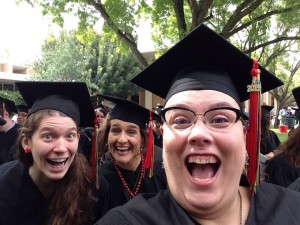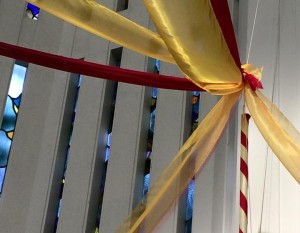Commencement Speech, Claremont School of Theology, May 19th, 2015

A little over three years ago, I decided, with the support of my family and friends, to pursue my call to ministry. As a Unitarian Universalist living in southern California, I had three choices for my Master of Divinity studies — two UU-identity schools that were low-residency, or Claremont School of Theology. There was well-meaning, but still intense, pressure to choose one of the UU identity schools, and I admit to leaning strongly in that direction. Then I came to a CST visit day.
What I found was a school that had taken its Methodist identity, and the Wesleyan call to put faith and love into action, and followed through all the way to its strangely heart-warming conclusion. It is easy to create a community when everyone in it believes the same things, thinks in the same ways, and comes from the same background. It would have been easy for CST to do “just enough”. Instead, this school recognized that “just enough” for right now would not even be close to enough for the future. In order to truly manifest the school’s mission statement to create agents of healing and transformation, a beloved community had to be fostered that respected the multitude of theologies, cultures, even languages that gathered here on this little campus. After just one day, I knew I could go nowhere else to truly “master” divinity.
I have not been disappointed. Yes, the school has great credentials. It’s accredited. It’s been named by the Religious Institute as one of the top thirty most sexually healthy and responsible seminaries in the country. It’s partnered with the Academy of Jewish Religion, the University of the West, the Indic Foundation, and been central to the creation of the Center for Sikh Studies, the Center for Jain Studies, and Bayan Claremont. During my three years here, I have shared classrooms with Muslims, Buddhists, Jews, Hindus, and numerous Christian denominations. But the most extraordinary thing has been how intentional this community has been creating something outside of the classrooms: helping us learn about each other, and how to thrive together, while making us better at being leaders in our own traditions. My fellow UUs and I are in the minority here, but we are encouraged to contribute, and to speak up when we have a different point of view. I am reminded of the words spoken by the Reverend Doctor Martin Luther King, Jr. to the Unitarian Universalist General Assembly in 1966: “There are those wonderful moments in life when you speak before a group that is so near and dear to you that you don’t feel like you have to engage in the art of persuasion. You don’t feel like you are in the midst of strangers. You know that you are with friends.”
I feel safe here. That quality is so much more than academic.
Which brings me to why I applied to be one of our commencement speakers today. I love this school, and not just because of the free massages and pizza during midterms. I have always been what pop culture calls “book smart”. I read really fast, I test well, and I write well. So the “school” part of this journey has been a lot of fun. I won’t go so far as to say easy… but fun. What set this experience apart from any other academic experience I’ve had is how much being in this community was also a learning experience of its own.
It has made me “heart smart”. I have spent so much of my life fighting against stereotypes and molds just to be seen and heard — as a woman person, as an outspoken person, as a fat person, as a parent person, as religious person — when I started here, I went through life resistance to me, always. All the time. There are no calm waters when you rock the boat simply by being in it. I felt constantly surrounded by strangers who needed persuading. Life was… exhausting. In my very first semester here, I was taken aback by how willing you all were — staff, faculty, and my classmates — to receive me. Me. And it has continued for all three years. “Tell me more,” you said. “I want to understand.” When I found myself in conflict between my schoolwork and my kids, you helped me find a way to include them. When I said, “What if we think about it this way?” you said, “Wow.” When I said, “This Systematic Theology paper has a soundtrack,” you listened to it.
One fall, my grandmother passed away the last week of the semester. All of my professors, the administration, and my advisor rallied behind me to get my incomplete filed so I could get on a plane as fast as possible — one even sending in paperwork from thousands of miles away. My classmates have often seen me better than I have seen myself, and brought me back into the fold of ministry when I doubted myself and my abilities to follow through on this long, difficult path. I am among friends. You have made me feel loved in a way that few people ever get to experience, and I will take that with me to share it with the rest of the world in all the ways that I am able.
This community has also made me “body smart,” and I’m not just talking about Feminist Ethics or Theology of the Body, although those classes were pretty epic. My time here has reminded me how integral our bodies are to our experiences of love and justice. I recognize now what I do to my own body, and how the systems in place in our cultures celebrate some bodies at the expense of others. I understand now that not only will sticks and stones will break our bones, but words most definitely hurt — they marginalize, they oppress, they erase people’s bodies completely from the narrative. And the narrative is where we find ourselves in communion with the Spirit of Life. You have taught me to be careful with my body and with the bodies of others, to be careful with my words and stories, and to use my body — including my loud mouth — to fight the good fight whenever and wherever I am able.
But that’s enough about me, and the graduates, and the faculty and staff. The biggest reason I wanted to speak up here today was to address the rest of you. All the friends and family sitting right in front of me, and watching the stream. None of us would be here, becoming Masters and Doctors, without you. You have put up with so much these last few years. You have waited until the end of a semester before suggesting that maybe we should clean our desks. You have forgiven us when we don’t return phone calls, texts, or emails. You have taken care of our children. You have worked hard at one, two, three jobs to pay our bills. You have kept us fed and clothed. You have endured countless nights alone. You have moved thousands upon thousands of miles across land and sea. You have left behind your home, your culture, even your language. You have said, time and time again, “I believe.” How blessed we are, to have been given such a precious gift. Know that you are appreciated. Know that you are loved. Know that you are just as much agents of healing and transformation as those of us about to walk across this platform.
Thank you, and blessed be.
